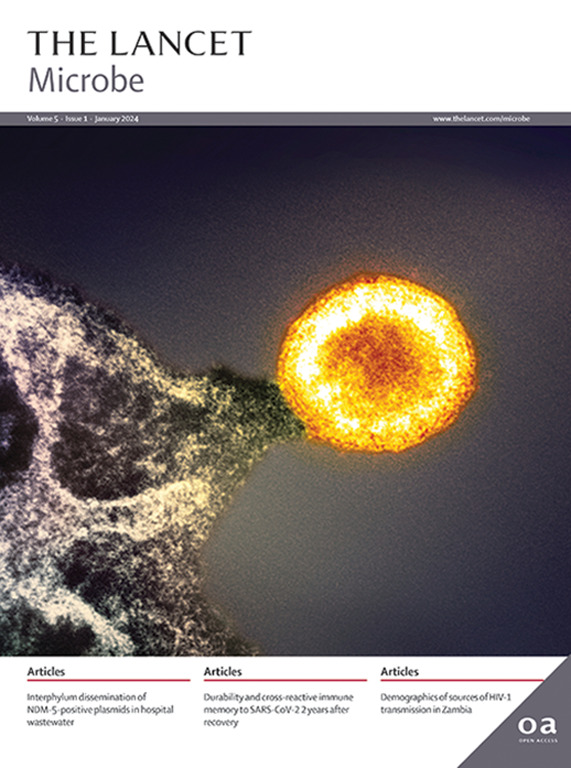使用人体挑战模型(CHIPS)确定预防化脓性链球菌引起的咽炎的最低青霉素浓度:随机、双盲、安慰剂对照试验。
IF 20.9
1区 生物学
Q1 INFECTIOUS DISEASES
引用次数: 0
摘要
背景:预防化脓性链球菌咽炎、复发性急性风湿热和进行性风湿性心脏病所需的体内血浆青霉素浓度尚不清楚。我们使用人类挑战模型来评估预防链球菌性咽炎所需的最低青霉素浓度。方法:CHIPS是一项随机、双盲、安慰剂对照的人体挑战试验,健康成年志愿者被计算机生成的随机序列随机分配到目标稳态青霉素血浆浓度(安慰剂、3、6、9、12或20 ng/mL)。该研究是在澳大利亚西澳珀斯进行的单中心试验。参与者必须是健康的成年人,年龄在18-40岁之间,患有复杂化脓性S疾病的风险较低,并且没有针对emm75化脓性S攻击菌株的高型特异性IgG抗体。参与临床护理的参与者和工作人员在研究期间仍然不知道治疗分配情况。在emm75攻毒菌株直接咽部应用前12小时开始个体化连续静脉输注青霉素5天。主要终点为临床咽炎。该试验已在澳大利亚新西兰临床试验注册中心注册,ACTRN12621000751875,并已完成。研究结果:在2022年8月23日至2023年7月31日期间,随机分配了60名参与者(35名[58%]女性,25名[42%]男性),其中57名纳入了分析。安慰剂组14人中有8人(57%)达到临床咽炎终点,3ng /mL目标稳态青霉素血浆浓度组9人中有4人(44%)达到临床咽炎终点,6ng /mL组4人(44%)达到临床咽炎终点,9ng /mL组8人没有达到临床咽炎终点,12ng /mL组8人没有达到临床咽炎终点,20ng /mL组9人没有达到临床咽炎终点。未发生严重不良事件。使用贝叶斯浓度-反应模型,90%的参与者能够避免临床咽炎的青霉素最低稳态血浆浓度为8.1 ng/mL(95%可信区间为6.1 - 10.9)。解释:当稳态青霉素浓度大于9 ng/mL时,很少有人会发生实验性emm75 S化脓性咽炎。这些数据将有助于改进长效青霉素制剂和剂量方案,以预防复发性风湿热和风湿性心脏病。资助:澳大利亚国家卫生和医学研究委员会。本文章由计算机程序翻译,如有差异,请以英文原文为准。
Establishing the lowest penicillin concentration to prevent pharyngitis due to Streptococcus pyogenes using a human challenge model (CHIPS): a randomised, double-blind, placebo-controlled trial
Background
The in-vivo plasma concentration of penicillin needed to prevent Streptococcus pyogenes pharyngitis, recurrent acute rheumatic fever, and progressive rheumatic heart disease is not known. We used a human challenge model to assess the minimum penicillin concentration required to prevent streptococcal pharyngitis.
Methods
In CHIPS, a randomised, double-blind, placebo-controlled, human challenge trial, healthy adult volunteers were randomly assigned by a computer-generated random sequence to target steady-state penicillin plasma concentrations (placebo, 3, 6, 9, 12, or 20 ng/mL). The study was a single-centre trial held in Perth, WA, Australia. Participants had to be healthy adults, aged 18–40 years, at low risk of complicated S pyogenes disease, and without high type-specific IgG antibodies against the emm75 S pyogenes challenge strain. Participants and staff involved in clinical care remained masked to treatment allocation for the duration of the study. Individualised 5-day continuous intravenous infusions of penicillin were commenced 12 h before direct pharyngeal application of the emm75 challenge strain. The primary endpoint was clinical pharyngitis. This trial is registered on the Australian New Zealand Clinical Trials Registry, ACTRN12621000751875, and is completed.
Findings
Between Aug 23, 2022, and July 31, 2023, 60 participants were randomly assigned (35 [58%] were female and 25 [42%] were male), with 57 included in the analysis. The clinical pharyngitis endpoint was met in eight (57%) of 14 in the placebo group, four (44%) of nine in the 3 ng/mL target steady-state penicillin plasma concentration group, four (44%) of nine in the 6 ng/mL group, none of eight in the 9 ng/mL group, none of eight in the 12 ng/mL group, and none of nine in the 20 ng/mL group. No severe or serious adverse events occurred. Using Bayesian concentration–response modelling, the minimum steady-state plasma concentration of penicillin for which 90% of participants would avoid clinical pharyngitis was 8·1 ng/mL (95% credible interval 6·1–10·9).
Interpretation
When steady-state penicillin concentrations are greater than 9 ng/mL, few people will develop experimental emm75 S pyogenes pharyngitis. These data will inform efforts to improve long-acting penicillin preparations and dosage regimens to prevent recurrent rheumatic fever and rheumatic heart disease.
Funding
The National Health and Medical Research Council of Australia.
求助全文
通过发布文献求助,成功后即可免费获取论文全文。
去求助
来源期刊

Lancet Microbe
Multiple-
CiteScore
27.20
自引率
0.80%
发文量
278
审稿时长
6 weeks
期刊介绍:
The Lancet Microbe is a gold open access journal committed to publishing content relevant to clinical microbiologists worldwide, with a focus on studies that advance clinical understanding, challenge the status quo, and advocate change in health policy.
 求助内容:
求助内容: 应助结果提醒方式:
应助结果提醒方式:


